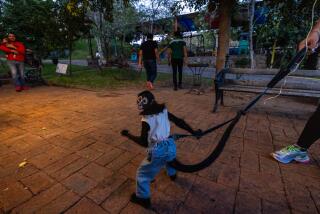Kitties, Bunnies and Doggies Get Dressed for Dinner
- Share via
GUANGZHOU, China — The flying squirrel’s brownish-red fur bristles when the shopkeeper rattles its cage. The startled animal retreats to a corner and stands defensively on its hind legs, saving itself for now.
The stall owner reaches into a different cage and pulls out another flying squirrel. The creature tries to escape, but the proprietor holds it up by the tail, proclaiming that its “aromatic” meat is “good for health.”
A restaurant owner counts out 200 yuan, or about $24, and says he can make the squirrel into about five or six pots of soup for a profit of about 100 yuan.
“It doesn’t have much meat after the fur is removed,” the restaurateur says, declining to provide his name at the Xin Yuan market on the outskirts of Guangzhou, capital of China’s prosperous Guangdong province.
Despite authorities’ attempts to stop the trade in state-protected animals and campaigns to discourage consumption of wildlife in general, business is booming at the market, which just 18 months ago offered only civets and a few other species for sale.
It was not clear whether the flying squirrel sold to the restaurant owner was an endangered type or not.
But during two raids in March, officials seized monitor lizards, owls, pangolins and birds like pekin robins, hwamei and pheasants--all under Chinese state protection, animal protection officers said.
One of the officers, who agreed to discuss the situation only on condition of anonymity, said some species listed as endangered by international organizations are not yet protected in China, so it is legal to kill and cook them. Among those are king cobras, masked-palm civets and leopard cats, a type of house cat.
The Xin Yuan market is one of many places where restaurant owners stock up to cater for the palates of the curious as well as the growing number of nouveaux riches in southern China and businessmen from Hong Kong.
A recent visit to Xin Yuan found leopard cats, giant turtles, masked-palm civets and king cobras for sale along with non-protected wild breeds like barking deer, wild boars and porcupines.
Unlike the more exotic species that are placed one to a cage, up to 25 domestic animals such as rabbits, cats and dogs are crammed one atop another in single cages about the size of two microwave ovens.
The trapped creatures look as if they can hardly breathe, with their faces pushed against the wire mesh and limbs sticking out of the row after row of cages lining the huge, stinking market.
Jill Robinson, founder of the Hong Kong-based Animals Asia Foundation, decries the “horrendous conditions” the animals face.
“Many were dehydrated,” said Robinson, who recently visited the market as part of her campaign against animal cruelty in China. “Some of them had missing limbs. Some were wounded and bleeding.”
In recent years, Guangdong authorities have launched a more vigorous crackdown on the illegal trade of killing and trafficking endangered animals, but the results appear to be limited.
Even Li Changchun, Communist Party secretary of Guangdong, urged local people and restaurants to keep wild animals off their dinner tables during the Chinese National People’s Congress meeting in Beijing in March.
One Guangzhou official said sellers are wary of openly selling owls and protected lizards, which can get them stiff penalties, but a black market is known to operate.
The official acknowledged that raids are easily thwarted. Dealers use cell phones so transactions do not take place at the market’s stalls.
“We can only rely on sources and secret visits,” he said. “It is hard to wipe out such sales because there is a demand and money to be made.”
Researchers at the Beijing-based China Wildlife Conservation Assn. surveyed 21,739 people and found that almost half had eaten wild birds or animals and believed their meat is more nutritious than farm-raised meat.
More than a quarter of the animals and birds that end up on the dinner table are from protected species, the researchers said.
At Nanguo Pearl Restaurant in Guangzhou--well known locally for exotic dishes--customers walk through the door and pick whatever wild animal they fancy, still sitting live inside the cages. On display are a crocodile, a spotted deer, a sea gull, a civet and sturgeon.
One cage listed prices for endangered white cranes, although the cage was empty. Asked about the cranes, a manager quickly removed the sign.
Inside, a woman was slurping down one of the restaurant’s signature dishes--Hundred Birds Returning to the Nest--and deer-blood steamed rice.
“It’s delicious,” she said, giving only her surname, Lung. “You should try it if you haven’t eaten this before.”
She said a waiter stir-fried the partially cooked meat from the birds--including rock pigeons, partridges and others--before stewing them with soup.
“The traders are making, obviously, a lot of money and are able to evade enforcement where it does exist,” Robinson said.
More to Read
Sign up for Essential California
The most important California stories and recommendations in your inbox every morning.
You may occasionally receive promotional content from the Los Angeles Times.













